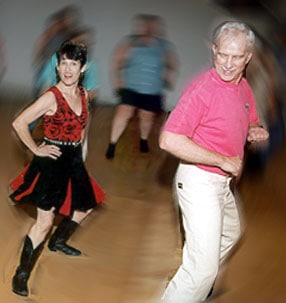Our First Kiss, August 2, 2001
Robert and I shared our first kiss nine years ago today, under the full moon after our line dance class. It wasn’t a sudden kiss — I had pursued this sexy, dancing man for nine months. We had danced, talked, strolled, even choreographed together — but, though always kind, he kept his distance. He admitted later that he was a little afraid of me, saw me sometimes as Spider Woman (!) because I was so assertive.
If you’ve read Better Than I Ever Expected: Straight Talk about Sex After Sixty, you know that I finally propositioned him by email. He turned me down, explaining gently that he didn’t make these decisions quickly or rush into sex. (Nine months: Quickly? Rush?)
Later that night he emailed me again. He had changed his mind!
“It’s been a while for these old body parts,” he wrote. “Maybe it’s time.”
We made a date to take a walk after the next dance class and discuss what to do next. We strolled under the full moon, not touching, and then stopped at a park bench.
There we shared our first kiss. And our second. Third. Twentieth.
We necked and petted like teenagers, the silver moonlight spotlighting our excitement. Then we made a plan to spend the following Saturday at his house and explore the next dimension of our relationship.
We didn’t know then that we would fall in love. But we did. I was 57 and he 64.
The memory of our first kisses remains strong in my mind, nine years later. So does the memory of our last kiss, two years ago today. As I wail with grief because Robert is gone, I embrace the precious joy of the seven years of great love that we shared. So many people never find that, and we did.
It is fitting that I finished writing Naked at Our Age the day before this significant anniversary, because Robert told me, shortly before he died, “Promise me you’ll keep doing your work.” I honor him by doing that.
His heart was beating under my hand
I had a beautiful dream about Robert, and as I approach the second anniversary of losing him, I keep rerunning the dream in my mind.
In the dream, I awoke to the sound of a song playing in my living room. I went down the steps, and there was Robert dancing! He was spinning so fast that he was almost a blur. He was dancing as he must have danced as a young man, before I knew him, when he was studying ballet and modern dance. I watched with love and amazement.
He slowed his spinning, then stopped and smiled at me, that tender smile that filled his eyes with softness. I put my hand on his chest, hot and moist from his exertion. Then the most wonderful part of the whole dream: I felt his heart beating under my hand!
So many times in our seven years together (exactly, from first kiss to last), I rested my hand on his beating heart. It was always the first place I touched when we came together. It was where my hand rested when we snuggled after making love. I loved his fuzzy chest hair–the touch and smell and heat of it–and I loved his beating heart.
Fun is Sexy: Making Love Before Making Love
Robert and I had rituals, made-up words, silly secrets, and special games that warmed us with laughter, kept our intimacy strong, and made us feel like we were making love all day long. Silly things, sometimes – like “Panda.”
 Robert and I used to exchange a tiny toy panda with paws that clutched tightly, permitting us to attach it to objects. I’d leave Panda attached to Robert’s shoelace, on his toothbrush handle, under his pillow, peeking out of his bathrobe pocket, even on top of the coffeepot — anywhere he’d find it unexpectedly and enjoy the surprise.
Robert and I used to exchange a tiny toy panda with paws that clutched tightly, permitting us to attach it to objects. I’d leave Panda attached to Robert’s shoelace, on his toothbrush handle, under his pillow, peeking out of his bathrobe pocket, even on top of the coffeepot — anywhere he’d find it unexpectedly and enjoy the surprise.  Then when one of us would find Panda astride our favorite vibrator, or holding onto the lubricant nozzle, or on the pillow, little legs up, we’d understand the special invitation!
Then when one of us would find Panda astride our favorite vibrator, or holding onto the lubricant nozzle, or on the pillow, little legs up, we’d understand the special invitation!Erotica Around the Table by Rae Francoeur
I loved every page of Free Fall: A Late-in-Life Love Affair, a sexy and poignant memoir by Rae Padilla Francoeur. Please read my review here. Thank you, Rae, for agreeing to write this guest blog post:
Once you write the words down, they no longer belong to you, a newspaper editor told me. Once I create a piece of writing, it’s out of my hands. I should not be surprised, therefore, by what happened to my erotic memoir, Free Fall: A Late-in-Life Love Affair, a few days ago.
The book is a candid and passionate portrayal of my love affair with Jim, which began when Jim was 67 and I was 58. Free Fall celebrates adult sexuality and encourages change, especially when we find ourselves in untenable situations. Jim and I had plenty of life under our belts when we met, including four grown children.
Recently, we sat at a restaurant with Jim’s daughter and a group of her friends. The friends took turns reading aloud the graphic sexual passages to Jim’s daughter. There were plenty of snickers and loud guffaws. The book was about senior sex, and young people consider that fair game for ridicule—even when their friend’s cherished father and his new lover are the butt of their jokes.
Jim was amused and unbothered by what his daughter’s friends did. It’s something men do to each other all the time, he said. They jam you up, test your mettle, play a form of psychological chicken.
As a woman and the author, my take is different. There are numerous short but graphic erotic scenes in Free Fall. A group of young men and women taking turns reading these sex scenes aloud in a public place feels akin to a verbal assault. We all knew that Jim’s daughter had no interest in reading about her father’s sexual prowess.
When I asked my daughter what she thought, the first thing she said was, “This is how it is with books. Once you write it and publish it, it’s no longer yours. It’s like a book burning, only mockery.”
Fortunately, my daughter, who happens to be a librarian, and her friends treated my book very differently. They bought and read the book and posted reviews on Web sites like GoodReads. They wrote both of us, sending along congratulations and rave reviews. I was invited to her library to read to patrons. It was one of the best nights of my life: my daughter, Jim, my daughter’s good friend, and a group of interested and open-minded patrons together sharing stories.
In Free Fall, I write a lot about letting go, staying open, not holding on so tight to what I think I know. Once again I find there is no such thing as a lesson learned for keeps. You learn a lesson in the moment and relearn it, when the need arises.
Check out Rae’s blog.





